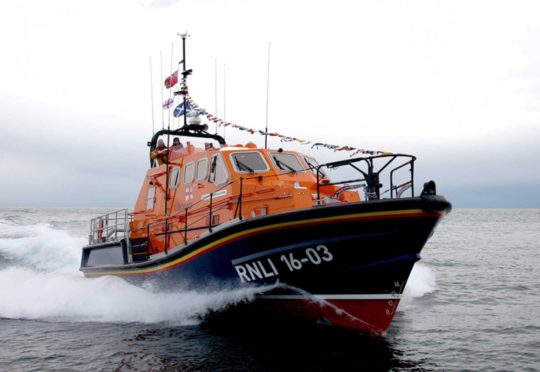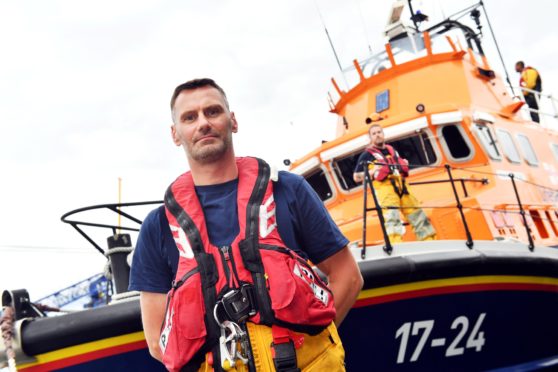Two north-east lifeboat crews are to receive the rare honour of a commendation from the RNLI after a dramatic 18-hour rescue mission off the coast of Peterhead.
The 14 crew members – seven from Aberdeen and seven from Peterhead, made up mostly of volunteers – will get the commendation in recognition of their efforts towing a trawler 25 miles to safety in October 2019.
In rough weather, the teams had to work together to complete a leg of the agonisingly slow journey each, while dealing with floods in the engine room and snapping tow lines.
Then-Peterhead lifeboat coxswain Allan Lipp was woken by his pager at 6.30am on October 27, and was joined at the station by mechanic David Weir (on his first shout in that post), navigator Martyn Simpson, and crewmates James Williamson, William Rhind, Murdo MacKenzie and Michael Dyke.
Not long after launch, they could tell they would not be in for a simple operation.
Allen, now the coxswain at Wick, said: “It wasn’t a bonny day.
“The only thing that was in our favour was it was an offshore wind, so it was fairly flat until we were further out.”
A ship in peril
It took about an hour to reach the fishing vessel Camm Defiance, a beam trawler featuring a long horizontal steel arm that extended from each side.
By the time Peterhead reached the scene, the sea’s swell was causing the beam to thrash in and out of the water.
Allen said: “You’ve got to try and stay out the way of it, because if that hits the lifeboat that could be disastrous.
“This vessel was pitching and rolling at the same time, so the beams were submerged on one side and quite far out the water on the other, and that would change quite rapidly.”
The trawler’s engine had failed, and it would need towed back to the safety of the harbour.
Allen said: “You’ve got two vessels, both potentially moving different ways, so you’ve got to try and manoeuvre the lifeboat safely as closely as you can to the casualty vessel.
“It was trying to manoeuvre closely enough to allow the crew on board the lifeboat, working out on deck in some pretty snotty conditions, to throw a 30m heaving line to the casualty vessel.”
Even after the line was attached, the conditions caused it to snap five times over the following nine hours, with the crew having to carry out the same perilous reattachment operation each time.
Meanwhile, new mechanic David was having to deal with a number of alarms as seawater entered the bilge in the lifeboat’s engine room.
By the mid-afternoon, when the boats still had 10 miles left of the 25-mile journey, Allen decided to call for help from Aberdeen.
Support arrives from the south
Despite leaping into action, it still took Aberdeen coxswain Davie Orr, mechanic Cal Reed, navigator Stuart Gibb and crew members Hannah Nash, Jim Buckley, Ricky Murray and Ciaran McRae an hour to travel the distance to the site.
They were met with force 8 winds and a swell of four to five metres.
After a tricky transfer, the tow ropes were set up at around 5.30pm, and Peterhead lifeboat was free to head to shore 11 hours after the initial call-out – though it was 9pm before the team was finally able to rest, having made the boat ready for service again.
Davie Orr’s team took up the slow task of pulling the 26-metre vessel for the final stretch to the harbour, arriving around midnight and eventually returning to Aberdeen at 1.30am.
Davie, who stepped down as Aberdeen coxswain in January, said: “It’s hard work for the crews, you’ve got to work as a team together to achieve that, and not only did we work as an Aberdeen crew and a Peterhead crew separately, we worked as crews together.
“I think we did that very well. There was good communication between the two boats.”
Diverse team of livesavers
Signed by RNLI Director of Lifesaving Operations John Payne, the commendation was received by the crews last month.
After describing the details of the shout, it concludes: “This was a long and demanding service.
“Your determination and commitment to saving lives at sea is greatly appreciated.”
Davie said: “It’s always amazing when you look at what the crew do for a living.
“Hannah works in the oil industry, Richard, he’s a plumber. Keiran’s a local councillor and he’s just joined the ambulance service. Stuart’s an electrician, and Jim is an IT specialist.
“When you look at the dynamics of where crews come from, with such different backgrounds, that all come together to do one thing and do it very well. It’s very humbling, and it’s a pride thing.
“It’s a very proud moment when you come back from a shout like that.”

